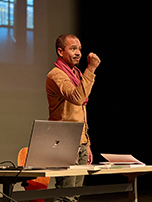Theatre Studies' Global South Fellowships and Scottish Theatre Archive Residency
Theatre Studies’ Visiting Fellows from the Global South 2025
 Hamish Mabala Neill, an Applied Drama/Theatre lecturer, project leader, and current Director of the Creative Research Hub (CRH) at Drama for Life, of the University of the Witwatersrand (Wits) in Johannesburg, South Africa. Hamish has worked on multiple, diverse, award winning (industry and civic) theatre-for-social-change projects including Through Positive Eyes (2012-13), AfriQueer (2015-17), and as initiator and lead of the celebrated applied theatre and public health project, Knowledge UNZIPPED (2016-2024).
Hamish Mabala Neill, an Applied Drama/Theatre lecturer, project leader, and current Director of the Creative Research Hub (CRH) at Drama for Life, of the University of the Witwatersrand (Wits) in Johannesburg, South Africa. Hamish has worked on multiple, diverse, award winning (industry and civic) theatre-for-social-change projects including Through Positive Eyes (2012-13), AfriQueer (2015-17), and as initiator and lead of the celebrated applied theatre and public health project, Knowledge UNZIPPED (2016-2024).
During his residency, Hamish offered a performative talk exploring significant moments in South African theatre history, dwelling on the meaning of ‘moment’ and where moments appear. Hamish also offered a workshop to students and professional theatre practitioners, focusing on workshop methods of South Africa. Hamish was joined by a number of leading Glasgow-based practitioners over a convivial lunch and sharing of experiences of applied and community engaged theatre practice. Amanda Cumberbatch, a Lecturer in Theatre Arts at the University of the West Indies, Cave Hill Campus, Barbados. Amanda previously worked as Cultural Officer, Theatre Arts, at the National Cultural Foundation, Barbados. A theatre practitioner with 35 years' experience, Amanda is an actor, director, playwright and theatre-in-education practitioner.
Amanda Cumberbatch, a Lecturer in Theatre Arts at the University of the West Indies, Cave Hill Campus, Barbados. Amanda previously worked as Cultural Officer, Theatre Arts, at the National Cultural Foundation, Barbados. A theatre practitioner with 35 years' experience, Amanda is an actor, director, playwright and theatre-in-education practitioner.
During her Fellowship, Amanda worked with professional Scottish actors -two of Caribbean heritage (Barbados and Jamaica, two of African heritage (Uganda and Zimbabwe), and one of British heritage (England) – to explore her play, Cry Water, Then Blood, in a different context. The play is a historical drama, and a fiction, set on the eve of the 1816 Easter Rebellion on the island of Barbados. After years of secret meetings, a group of rebels on a plantation in the east of the island prepare to execute their roles in an island wide "freedom plan". In Africa born 'Lottie' we find a heroine in the struggle for liberation from enslavement, and we are offered much insight into the bonds of kinship on Plantation Barbados.
Theatre Studies’ and Scottish Theatre Archive Practitioner’s Residency 2025
Ashanti Harris was appointed as our first Resident in the Scottish Theatre Archive. Ashanti is a Glasgow-based, trans-disciplinary artist, researcher and lecturer exploring themes of identity and diaspora. Recent work has been centred in deconstructing colonial and post-colonial narratives and re-imagining them from a Caribbean diasporic perspective, working with sculptural processes and archival materials alongside a participatory and performative framework.
Here we share Ashanti’s Statement of Intent for her Residency:
“The first and only time I have engaged with the Scottish Theatre Archives was in 2017 when I was researching the presence and legacies of African and Caribbean Dance in Scotland. I was researching Les Ballets Negres, also known as Britain's first Black dance company, and I had learnt from a tour list that they had performed in Glasgow. To give a little more context about Les Ballets Negres - they formed in 1946 under the leadership of Berto Pasuka, a Jamaican dancer and choreographer who arrived in Britain in 1939 with dreams of forming a culturally diverse dance company to showcase the dances of the Black diaspora. Les Ballets Negres included members from Jamaica, Ghana, Nigeria, England, Trinidad and Spain, and their choreography combined traditional European ballet and modern dance structures with the cultural dances of the Caribbean and West Africa. When I discovered that Les Ballets Negres performed in Glasgow, I was eager to learn when and where and what the impact of their presence was. I found that the Scottish Theatre Archives had a programme for their week-run of performances on the 15th July in The Theatre Royal in Glasgow. From this, I learnt that the company performed four dances from their repertoire in Scotland but there was no year attached to the archival document. Furthermore, at that time the document did not list the name “Les Ballets Negres” but instead “The Negro Ballet”. There were so many missing pieces and so many reasons why Britain's first Black dance company might exist almost invisibly or like a shadow in the Scottish Theatre Archives. But honestly, this was the beginning of a romance for me. I was so inspired and in love with this dance company and I was committed to delving into the depths of the archive if it meant I could find them in Scotland and find more things to love about them.
To cut a long story short, I did find out a lot more about Les Ballets Negres and the various legacies of their trip to Scotland, including the date of that first performance in the Theatre Royal. My research romance blossomed into a thesis, multiple performances (images included in this application), and most recently a commissioned video work about the dance company for the reopening of Paisley Museum (re-imagining the dances of Les Ballets Negres with BPoC contemporary Scottish dancers).
My proposal for this residency is to use this “research romance” as a creative methodology for uncovering Black histories in the Scottish Theatre Archive. A love story. Looking for what is hidden, hard to see, or difficult to understand. Following the traces, being led by feelings, and my commitment to researching Black history. Looking for love! I’m approaching this “searching for love in the archive” as a performative act in itself that includes the understanding that I might not find what I am looking for but the performance and the research is the act of longful searching.
Why is this work important?
Historically, African and Caribbean diasporic art forms have, for the most part, been rendered invisible within Scottish cultural or historical institutions. Without legacy, these art forms are continuously relegated to the category of ‘emerging’, in other words, newly arrived. This ‘newly arrived’ narrative not only denies the contribution of these art forms to Scottish history and culture, it also continues insidious white supremacist narratives and racial hierarchical systems of classification. Challenging these notions, this research in the Scottish Theatre Archives performs a re-telling of Black history in a Scottish context, searching for the loves, the legacies and the “ancestors” that paved the way for contemporary BPoC performance makers working in Scotland now.
What does this” research romance” look like in practical terms?
In her publication, Creole in The Archive, Roshini Kempadoo coined the concept of “the contiguous archive”, referring to a dynamic, expanded archive of contiguous formations that are apparent in multiple locations. The contiguous archive is an “imaginative, transgressive, hybrid and dynamic archive which cannot be considered stable and retroactive but is instead a generative practice using forms which are participatory and performative”.
Contiguous – In the context of Roshini Kempadoo’s Contiguous Archive, “the word contiguous signifies a physical and metaphorical construct created and emanating from the interrelationships made between visual cultural forms, spaces and language.” Turning to Roshini Kempadoo’s conceptual framework of the ‘contiguous archive’ and acknowledging the problems inherent within static, retroactive representations of history, this is a proposal to make meaning and knowledge through a connected process. I will work with the archival materials held in the archive and dynamic processes of de-constructing and re-constructing narratives.
My aim is to uncover and re-assert the legacies of Black history and culture in Scotland. I will document my research process in writing, sound recording and moving image. I anticipate that the final outcome will be shaped by the process and I have no set expectation of what the final outcome will be, however, it is important to me to create something shareable - bringing these “hidden” histories out of the archive and into the world.”

